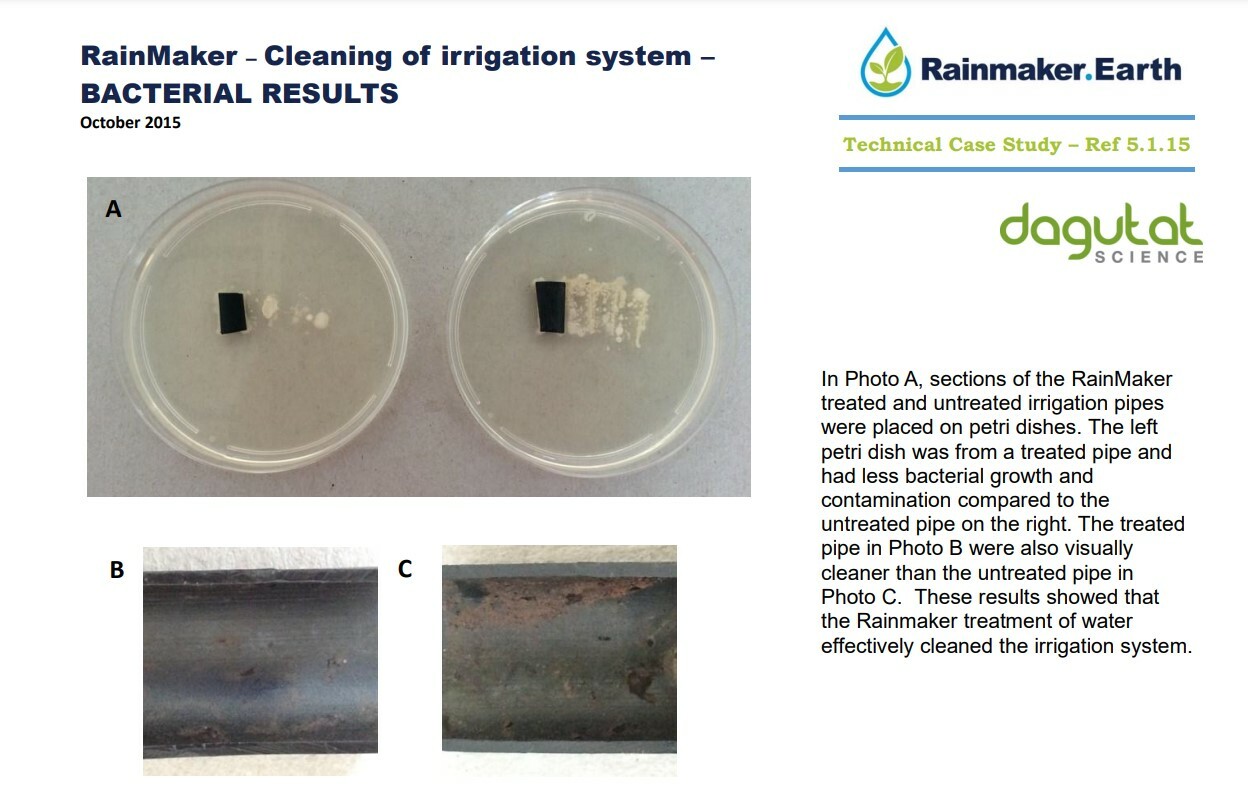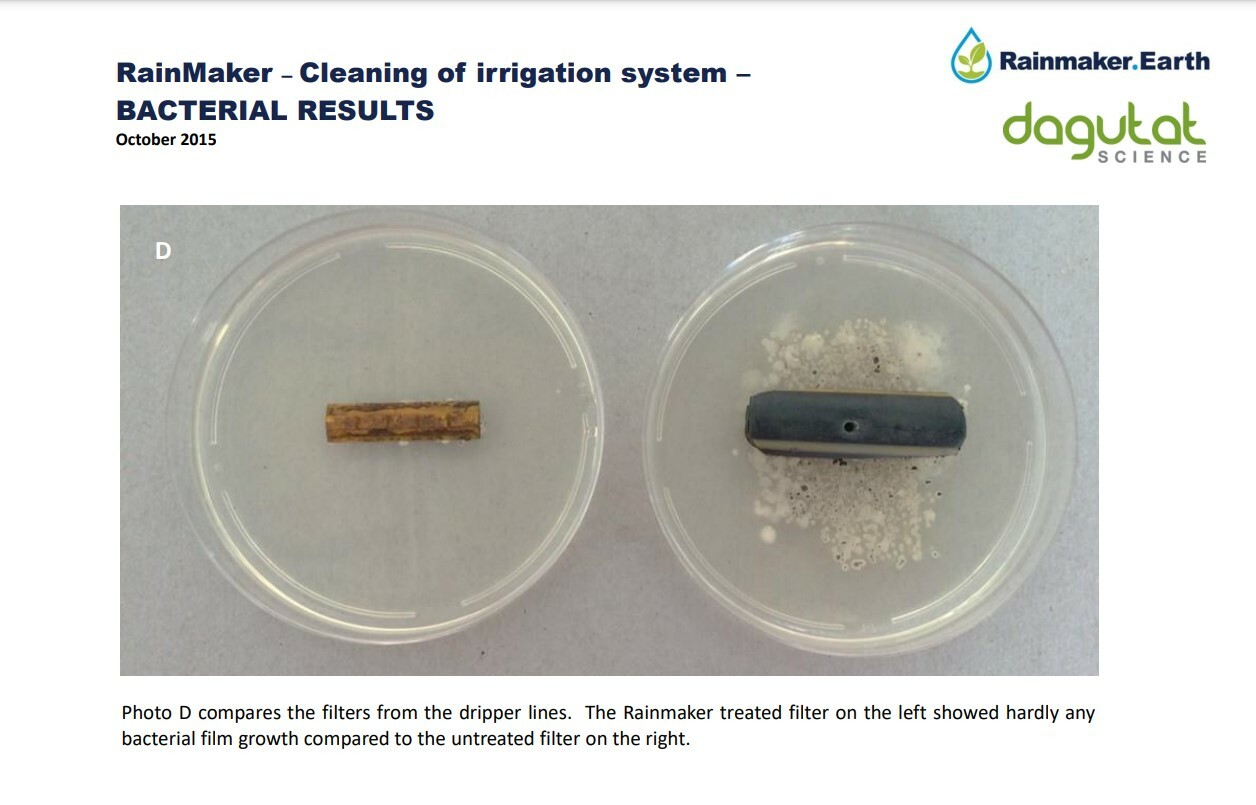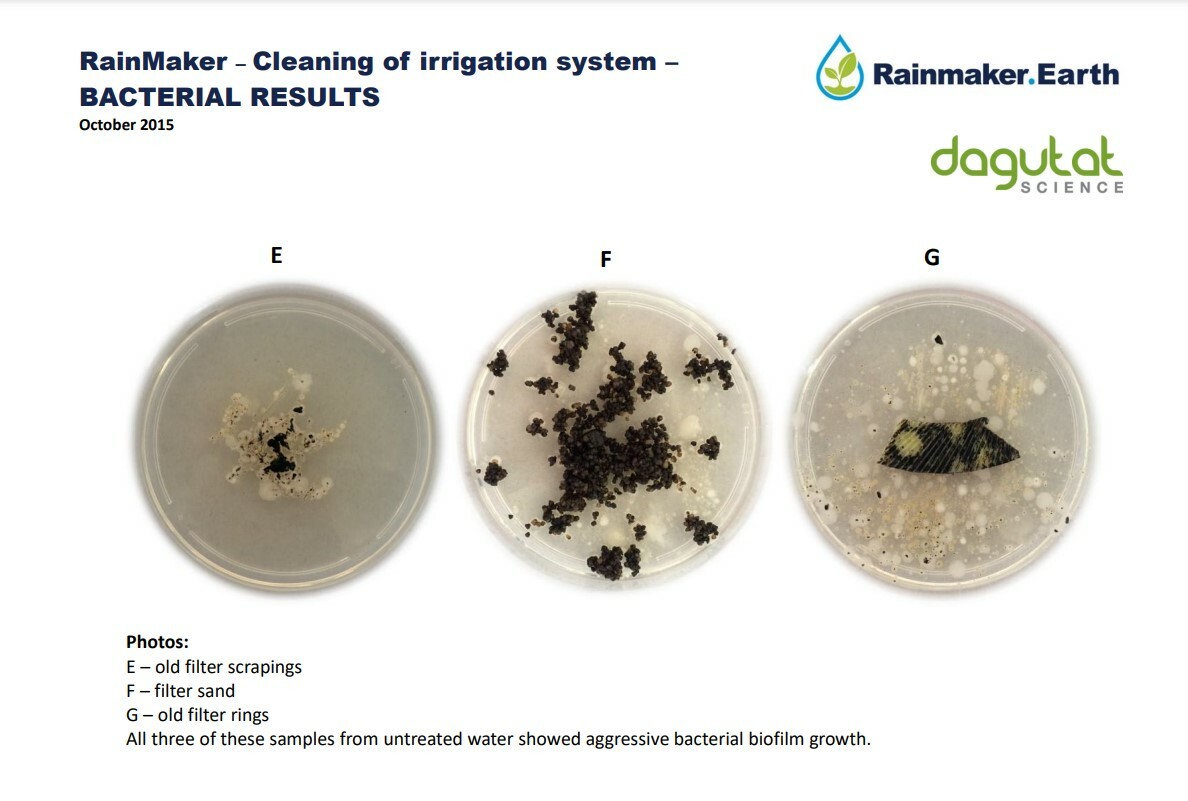This study examines the impact of advanced water treatment on irrigation systems. Findings reveal that treated pipes and filters exhibited significantly lower bacterial growth and contamination compared to untreated systems. The reduction in biofilm formation in treated samples confirms that water treatment plays a crucial role in maintaining cleaner, more efficient irrigation infrastructure.
Visual Evidence: The Impact of RainMaker Treatment on Irrigation System Cleanliness

A controlled study was conducted to compare the bacterial contamination in irrigation pipes treated with RainMaker technology versus untreated pipes. The results were analyzed using both petri dish cultures and visual inspection.
Bacterial Growth Analysis (Photo A)
Sections of both RainMaker-treated and untreated irrigation pipes were placed on separate petri dishes.
The left petri dish, containing a sample from the treated pipe, exhibited significantly less bacterial growth and contamination compared to the untreated sample on the right, which showed extensive bacterial colonization.
Visual Pipe Comparison (Photos B & C)
Photo B presents a section of an irrigation pipe that had undergone RainMaker treatment, appearing noticeably cleaner and free of visible biofilm buildup.
In contrast, Photo C showcases an untreated pipe, which displayed significant biofilm accumulation and internal contamination.
Key Findings & Implications
The study demonstrates that RainMaker-treated water effectively inhibits bacterial growth, reducing biofilm formation within irrigation infrastructure.
Cleaner pipes contribute to more efficient water flow, reduced clogging, and lower maintenance costs.
By preventing biofilm accumulation, RainMaker technology enhances the longevity and performance of irrigation systems, ensuring more consistent and high-quality water delivery.
These findings reinforce RainMaker’s role as a proven solution for improving irrigation system hygiene, efficiency, and sustainability.
RainMaker Treatment: Improving Filter Cleanliness in Drip Irrigation Systems

A comparative study was conducted to assess the effectiveness of RainMaker-treated water in preventing bacterial biofilm buildup in irrigation system filters. Photo D highlights the key differences between treated and untreated filters, demonstrating the impact of advanced water treatment on irrigation system maintenance.
Filter Comparison (Photo D)
The left filter, which was exposed to RainMaker-treated water, exhibited minimal bacterial film growth, maintaining a significantly cleaner surface.
In contrast, the right filter, from the untreated system, showed noticeable biofilm accumulation, indicating higher levels of bacterial contamination.
Key Findings & Benefits
Reduced Biofilm Formation: RainMaker-treated water effectively inhibits the growth of bacterial films, preventing clogging and blockages in dripper lines.
Enhanced System Efficiency: Cleaner filters contribute to more consistent water flow, improved irrigation uniformity, and reduced maintenance needs.
Extended Equipment Lifespan: By minimizing bacterial buildup, RainMaker treatment prolongs the operational life of filters and irrigation components, reducing replacement and labor costs.
These findings reinforce RainMaker’s effectiveness in improving irrigation system hygiene, optimizing performance, and supporting sustainable water management.
Evidence of Bacterial Biofilm Growth in Untreated Irrigation Systems

A study was conducted to evaluate the extent of bacterial biofilm accumulation in irrigation system components exposed to untreated water. Photos E, F, and G provide clear visual evidence of contamination, highlighting the challenges of maintaining irrigation infrastructure without proper water treatment.
Biofilm Contamination in Untreated Systems
Photo E – Old Filter Scrapings:
Scrapings from an old filter showed significant bacterial biofilm accumulation, indicating persistent microbial growth and potential system inefficiencies.
Photo F – Filter Sand:
Sand from an untreated filtration system was heavily contaminated, demonstrating how biofilms infiltrate and compromise filtration media, reducing water quality and flow efficiency.
Photo G – Old Filter Rings:
Filter rings exhibited extensive bacterial buildup, reinforcing the need for effective treatment to prevent clogging and system degradation.
Key Findings & Implications
Increased Maintenance Needs: Heavy biofilm growth in untreated systems leads to frequent clogging, higher maintenance costs, and reduced irrigation efficiency.
Decreased Water Flow & System Performance: Contaminated filtration media and clogged components restrict optimal water movement, impacting overall irrigation effectiveness.
The Need for Advanced Water Treatment: These results highlight the importance of RainMaker technology in preventing biofilm formation, ensuring cleaner, more efficient irrigation systems with reduced downtime and maintenance.
By implementing RainMaker-treated water, irrigation infrastructure can be protected from bacterial contamination, leading to longer system lifespan, improved water efficiency, and lower operational costs.